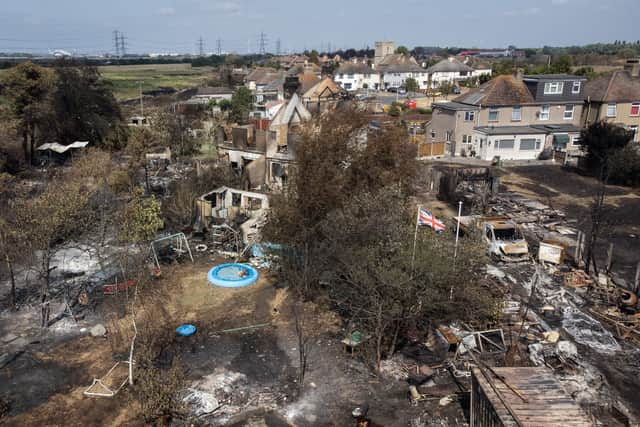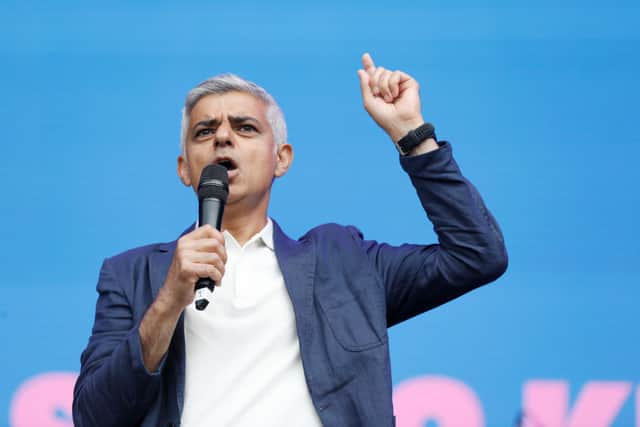UK fires: map of wildfires and house fires caused by heatwave 2022 - from London to Dartford and Norfolk
and live on Freeview channel 276
As temperatures in England reached record breaking highs, firefighters faced their busiest day since the Second World War after major incidents were declared in London, Norfolk, Suffolk, Lincolnshire, Leicestershire and South Yorkshire on Tuesday as fires broke out amid the tinder-dry conditions.
Firefighters took on at least 22 wildfires as well as hundreds of smaller blazes across the country as residents were evacuated from their homes.
This is what you need to know.
What happened?
Advertisement
Hide AdAdvertisement
Hide AdTwo “large-scale” incidents took place in Upminster and the village of Wennington, east London, where black smoke billowed into the air, while flames destroyed buildings and ravaged nearby fields.
Residents of the village were evacuated from their homes, and a firefighter who took on the blaze in Wennington reportedly described the conditions as “absolute hell”.


Sixteen firefighters were injured tackling the blazes with two who were admitted to hospital, London Fire Brigade (LFB) assistant commissioner Jonathan Smith told Times Radio.
He said: “The conditions that our firefighters were operating in were unprecedented – operating in 40C heat, needing to drag significant amount of hose across fields, making sure we were rescuing people where we needed to.
Advertisement
Hide AdAdvertisement
Hide Ad“We had 16 firefighters suffering from heat-related injuries, two of whom were hospitalised, but I’m pleased to say have now have been released from hospital.”
Northwest of Leicester a major grass fire at Bradgate Park saw five pumps and a water carrier called out to the scene, whilst fire services told residents in Walton on the Wolds to keep their windows closed due to a large barn fire.


In Nottinghamshire, a large forest fire led to the evacuation of local residents over fears that the fire could destroy buildings in the village because of the wind direction.
Lincolnshire Fire and Rescue, which experienced the country’s hottest temperature on record, 40.3C, said that it had 25 fire engines at a number of different incidents across the county on Tuesday, including eight fire crews attending a blaze at a four storey apartment block in Haven Village.
Advertisement
Hide AdAdvertisement
Hide AdA number of houses caught fire in Dartford from a major fire by the A2, and in Milton Keynes a fire destroyed three houses and a single story building.
Firefighters in Norfolk were called to more than 80 incidents on Tuesday, including one that started in a field in the village of Ashmanhaugh and spread to two homes.


Doncaster Council also announced that a fire in Clayton had spread to three residential properties, with further reports of houses on fire in the Kiverton Park and Maltby areas of Rotherham.
Suffolk Fire and Rescue Service said it had been called to more than 60 incidents, 38 of which were fires in the open, describing the situation as “unprecedented”.
What has the Government said about the fires?
Advertisement
Hide AdAdvertisement
Hide AdSadiq Khan said the LFB had experienced its busiest day on record, receiving more than 2,600 calls throughout the day – seven times the usual number.
The London Mayor told Sky News: “Yesterday was the busiest day for the fire service in London since the Second World War.”


He added: “Yesterday they received more than 2,600 calls – more than a dozen simultaneous fires requiring 30 engines, a couple requiring 15, and some requiring 12.
“I’m afraid the bad news is, 41 properties were destroyed in London.”
Advertisement
Hide AdAdvertisement
Hide AdSimon Clarke, the Chief Secretary to the Treasury, also told Sky News that the fires were a “warning sign” about the impact of climate change.
“This is a remarkable, unprecedented event and something which obviously, because people have been saying, we are not used to seeing in this country,” he said.
“What we’ve seen in recent days is not normal and it is a warning sign.”


Clarke also promised that the Government will “step in” to help families hit by major blazes sparked by the extreme heat.
Advertisement
Hide AdAdvertisement
Hide AdHe did not say specifically what help the Government might provide to those without insurance, whose homes or belongings were destroyed.
“The Government will stand by people who need assistance,” he told Sky News.
“The Government will be looking carefully at what we can do to make sure that everyone receives the support they need.
“And obviously, the first thing is to make sure that they have the support in the very immediate term – people may have lost all their belongings, their identity documents.
“I know our local councils will be stepping up to look after people who’ve been affected across the country by fires, but clearly central government stands ready as always to step in as needed.”
Comment Guidelines
National World encourages reader discussion on our stories. User feedback, insights and back-and-forth exchanges add a rich layer of context to reporting. Please review our Community Guidelines before commenting.
